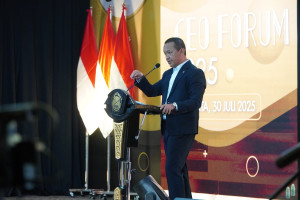Chief executive officers from Indonesia’s upstream oil and gas contractors (KKKS) reaffirmed their commitment to achieving national production targets for 2025 during the CEO Forum Hulu Migas in Jakarta on Wednesday, July 30, 2025.
The high-level meeting was attended by Energy and Mineral Resources (ESDM) Minister Bahlil Lahadalia, Head of The Upstream Oil and Gas Regulatory Task Force (SKK Migas) Djoko Siswanto, senior ministry officials, and industry leaders.
The CEOs pledged to reach the 2025 lifting targets of 605,000 barrels of oil per day (BOPD) and 5,628 million standard cubic feet per day (MMSCFD) of gas.
In his keynote address, Bahlil emphasized the strategic importance of oil and gas lifting, noting that it remains a top priority under President Prabowo Subianto’s ASTA CITA national agenda.
He acknowledged that the national lifting target has not been met since 2008 and urged industry players to adopt more innovative and collaborative approaches.
“There are still significant opportunities to increase lifting as long as we are willing to work together, remain open, and collaborate. The government has the authority to issue policies, and KKKS have the operational capacity the synergy between both is essential,” Bahlilsaid.
He highlighted the underutilization of Indonesia’s hydrocarbon basins, noting that only 20 out of 128 known basins are currently producing. He criticized the stagnation of approved development plans (PODs), warning that the government would take firm action if projects are not executed promptly.
To ensure swift resolution of regulatory issues, Bahlil announced he had been tasked by President Prabowo to be stationed at SKK Migas as head of upstream administrative coordination.
“If permits are stalled, I will personally intervene. But for those who have completed the permitting process, there is no excuse projects must proceed immediately,” he said.
The minister also called for stronger community engagement and local empowerment, ensuring that oil and gas activities benefit the surrounding populations.
He noted that fiscal incentives are now in place to make projects economically viable under either gross split or cost recovery schemes. “Indonesia still imports oil. That is why accelerating domestic oil production is non-negotiable,” he said.
During the forum, updates were presented by SKK Migas deputies for exploration, development, and exploitation. SKK Migas reported that as of the first half of 2025, oil and gas production had surpassed performance from the same period in 2024. The agency is optimistic that the 2025 lifting target of 605,000 BOPD can be reached under the high-case scenario.
Despite acknowledging mid- and low-case scenarios, SKK Migas and KKKS reiterated their resolve to pursue the high-case scenario as a show of full support for the President’s energy resilience strategy.
The industry also views 2025 as a critical foundation for achieving longer-term targets including lifting crude oil production to 900,000–1 million BOPD by 2030. SKK Migas noted a steady rise in exploration investment, which hit US$1.3 billion in 2024 and is forecasted to reach US$1.5 billion in 2025, the highest level in a decade.
The forum concluded with a shared commitment to enhance upstream investment, deliver safe and efficient operations, and contribute meaningfully to Indonesia’s energy independence goals.
